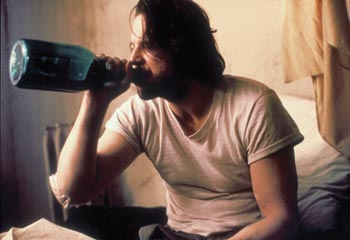Over the years, I have read nuggets of text about Mickey Rourke having performed a little-known “mid-song rap” on a David Bowie song titled “Shining Star (Makin’ My Love)” from a 1987 David Bowie album titled Never Let Me Down. After curiousity knawed at me over the years, I finally sought out this curiosity.
If the song is any indication of the album’s general quality, Never Let Me Down probably quickly migrated in all its crappy glory to the marked-down bin of local record stores (when there was still such a thing as record stores) and onto the trash heap of musical history. The song itself is the worst that ’80s pop has to offer. “Shining Star” sounds like it should be the love theme to a bad Andrew McCarthy romantic movie from the late ’80s (think Mannequin [1987]) or the theme song for the opening credits of some horrible late ’80s sitcom produced by the makers of Full House [1987] with the imagined premise of a rocky yet comedic courtship between a guy and a girl. “Shining Star” exhibits the summation of ’80s pop-culture vacuousness as that decade’s culture slowly ground to a halt and collapsed under the weight of its own nothingness.
One of my primary questions is how Mickey Rourke came to be on this song. Who said, “David’s making his latest album, which will be ten generations away from his former musical genius and layered with the most trite pop orchestrations possible. Let’s bring in Mickey Rourke to do a mid-song rap to punch it up.” My secondary question is, “What the hell is Mickey Rourke singing…err…rapping about in this song?!” After repeated listenings, I can only make out a surreal, discombobulated jumble of references to Sien Fien and something about “life to the grave.” The awfulness of Rourke’s “mid-song rap” is surpassed by the sheer artistic collapse of David Bowie throughout the rest of the song.
The only clue to this mysterious creative collaboration is from an interview Rourke did with The Times (UK edition) in which Alan Parker is quoted as saying, “He wasn’t difficult, he was naughty,” says Parker. “He admired rock’n’roll stars. He didn’t want to be a movie star. To him, movie stars were Harrison Ford and people that he didn’t like. He wanted to be David Bowie.”[1]
Justin Baker
End Notes
[1] Ariel Leve, “The Rourke’s Progress,” The Times, April 10, 2005, http://www.timesonline.co.uk/tol/life_and_style/
article441301.ece
